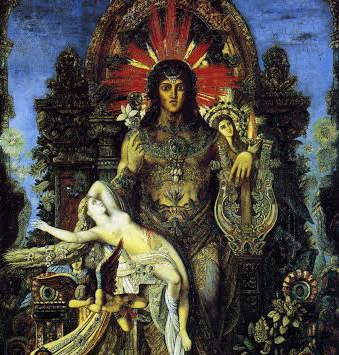Dionysus:
Here I am, Dionysus, Zeus’s son,
the god whom Semele, the daughter of Cadmus,
birthed, with a bolt of lightning for a midwife.
I am back home in the land of Thebes.
My sacred form exchanged for this mere mortal
disguise, I have arrived here where the Springs
of Dirce and the river Ismenos
are flowing. I can see my lightning-blasted
mother’s tomb right there beside the palace,
and I can see as well her former bedroom’s
rubble giving off the living flame
of Zeus’ fire—Hera’s deathless rage
against my mother. I am pleased that Cadmus
has set the site off as a sanctuary
to keep her memory. I am the one
who covered it on all sides round with grape leaves
and ripe grape clusters.
……………………………………..I have left behind
the gold-rich country of the Lydians
and Phrygians, the Persians’ sun-struck plains,
the battlements of Bactria, and passed through
wealthy Arabia and Asia Minor
where, all along the barren ocean, towns
with handsome circuit walls enclose non-Greeks
and Greeks alike. I came to this Greek city
first of all, made it dance and instituted
my wild rites so that the people here
see my divinity with their own eyes.
I have compelled this town to rant and howl,
dressed it in fawnskin, put my pine-cone-tipped
and ivy-vested spear into its hands,
and all because my mother’s sisters claim
that Zeus is not the father of Dionysus—
how could they speak such slander? They allege
some mortal sired the child on Semele,
and she blamed Zeus for her disgraceful error
on Cadmus’s advice. That’s why (they say)
Zeus smote my mother with a lightning bolt—
because she lied about the pregnancy.
So I have maddened them in retribution,
driven them from their homes, and they, unhinged,
have occupied a mountain. I have forced them
to don the vestments of my rites. In fact,
the women of Thebes—all of them, every one—
under my influence, have fled their homes
in madness. Mixed among the daughters of Cadmus,
they lounge about in broad daylight on cliffs
beneath the green fir trees. Since Thebes is still
ignorant of my rites, it needs to learn them—
even against its will. I must defend
the honor of Semele by teaching mortals
it was a god she bore to Zeus.
……………………………………………..What’s more,
Cadmus has handed down the privilege
of kingship to his grandson Pentheus,
who, as I see it, wages war on god—
he bars me from the honors owed to me
and never names me in his prayers. My godhood
therefore must be driven home to him
and all of Thebes. I will be off again,
once matters have been settled here, to show
my glory elsewhere. If the city of Thebes
attempts to drive my Bacchants from the mountain
with spears and anger, I shall lead the Maenads
against it like a general. To that end
I have disguised my superhuman form
beneath the trappings of a mortal man.
(Turning to the Maenads)
You who have left Mount Tmolus, the bulwark
of Lydia, all you devotees whom I
have led out of barbaric lands to serve
as confidants to me in peace and war,
take up the drums they use in Phrygia, my
and Mother Rhea’s special instrument,
and gather round the royal palace of Pentheus!
Beat time now, and let the townsfolk stare!
I meanwhile will go up to Mount Cithaeron,
join my Bacchants and enjoy their dances.
*****
Aaron Poochigian earned a PhD in Classics from the University of Minnesota in 2006 and is completing an MFA in Poetry at Columbia University. His book of translations from Sappho, Stung With Love, was published by Penguin Classics in 2009, and his translation of Apollonius’ Jason and the Argonauts was released October 2014. For his work in translation he was awarded a 2010-2011 Grant by the National Endowment for the Arts. His first book of original poetry, The Cosmic Purr (Able Muse Press) was published in March of 2012, and several of the poems in it collectively won the New England Poetry Club’s Daniel Varoujan Prize. His work has appeared in the Financial Times, Poems Out Loud and POETRY.
Read more from Ancient Greek:

